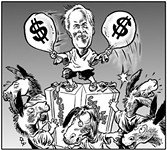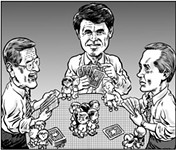The Other Guys
Beneath the mud-slinging, Greens and Libertarians look for grassroots votes
By Michael King, Fri., Aug. 30, 2002
The Greens appeal primarily to disaffected progressive Democrats and those on the democratic left who had abandoned electoral politics altogether. The Libertarians generally lure populist Republicans disillusioned by the party's corporate mainstream, or cultural rebels (post-hippie, post-punk, and cyber-wonk) who just want to be left alone.
As that reductive summary suggests, the left margin and the right margin can often meet somewhere in the middle. Green and Libertarian sympathizers are likely to agree about: the military draft (don't want one); civil liberties (expand and defend them); the war on drugs (cease and desist immediately); and government subsidies of corporations (ditto). The two groups diverge most strongly on the Libertarians' reflexive devotion to "the free market" as the private solution to virtually every public problem, while the Greens generally place more faith in the necessity of democratic government to protect and defend the public interest.
Building a Coalition
Mahajan is best known to Austinites as a UT student anti-war activist, with a focus on the U.S. siege-war against Iraq. (Mahajan's family is originally from India, but he was born in Philadelphia and has lived in Austin since 1977.) This year, while completing his dissertation for a Ph.D. in physics, he somehow found time to write The New Crusade: America's War on Terrorism (Monthly Review Press), an excoriating analysis of U.S. foreign policy since Sept. 11.
Earlier this year Mahajan said he was running for governor in order to "broaden the range of debate" in state politics. Now he says with a laugh that he hopes to "create any discussion at all, since the big party candidates aren't interested in talking about any issues ... but instead only want to attack each other." He continues to speak out against the war in Iraq, particularly as the Bush administration increases the pressure for an outright military assault of some kind, and he adds that from a state perspective, this is an issue more central than people realize. "Texas participates very heavily in the military-industrial complex," Mahajan said, "both in terms of military bases and military production -- our whole economy is becoming increasingly militarized." He includes in that trend the push for "homeland security" since Sept. 11: "Instead of truly improving public safety, it's become an excuse for the increasing militarization of domestic law enforcement."
Mahajan sees the Green Party's state and national campaign as an attempt to build grassroots activism across a wide range of issues. "We've now got a real chance to build a broad coalition for peace, for social welfare, against the death penalty, for environmentally sound energy policies, and against corporate control of the political process. There's now a lot more space for opposition. But the critical factor is how much dissent we can organize at the grassroots -- without that, the elites will close ranks and move forward with Bush's current policies."
Does he think the Greens could effectively weaken the possibility of progressive change in Texas, by drawing enough Democratic votes to swing close elections to Republicans? "I think in my own race, that's hardly an issue, because Tony Sanchez is a Republican in Democrat's clothing. We're being offered a choice between Bush's successor and one of his biggest 'Pioneer' contributors. Perry and Sanchez both represent a continuation of the Bush legacy in Texas, and the Greens represent a true alternative."
Less Is More
The most immediate connection between Texas Libertarians and Greens is their objection to the state election laws that make it so difficult for alternative parties to get on the ballot and stay there. Libertarian political director Robert "Rock" Howard and gubernatorial candidate Jeff Daiell strongly advocate electoral reform. "Texas is particularly bad for ballot access," said Howard. "It's ranked 35th or 38th in the U.S. in difficulty." A bill to cut the number of required signatures from 40,000 to 10,000 has languished in legislative committee for years, and one reason both parties are running in every statewide race is to stay on the ballot: 2% in the governor's race or 5% in any other statewide race makes the cut (for four or two years).
On the issues, Daiell emphasizes limited government and cutting both taxes and regulation. "We're strongly in favor of individual rights," he said, "and of reducing the amount of government interference in the economy." He says a Libertarian administration would employ the state's sunset law to steadily eliminate bureaucracies, beginning with the Railroad Commission and moving throughout state agencies. Daiell's faith in market solutions, from the environment to foster care, is virtually absolute. He works for a health insurance company, and says the health care crisis is largely a result of "lack of competition" for the benefit of practicing physicians: "We need to open that licensing monopoly held by doctors," Daiell said, "and let the market decide who are the incompetent or unethical physicians." Libertarians, he says, also want to "eliminate the state's participation in the war on drugs, and move law enforcement away from 'lifestyle crimes' [e.g., drugs and sex] to focus on crimes of violence, theft, and fraud. We believe strongly in due process and civil liberties."
Howard is enthusiastic about the growth of both the Libertarians and the Greens. "One third party cannot break through the [Republican and Democratic] duopoly. ... We need to harness the energy of all the people ... who really want to accomplish change." ![]()
The Green and Libertarian candidates for governor will be holding a debate at UT on Thursday, Sept. 26, specific time and venue to be announced. The major party candidates will be invited.
Got something to say on the subject? Send a letter to the editor.








